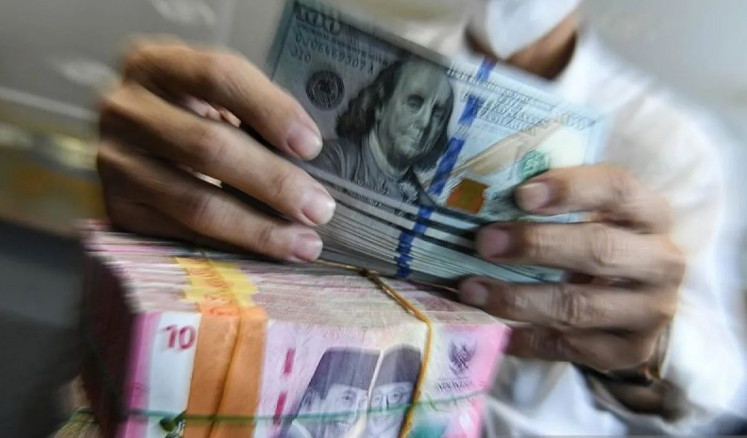Popular Reads
Top Results
Can't find what you're looking for?
View all search resultsPopular Reads
Top Results
Can't find what you're looking for?
View all search resultsElections and economists
"Hidup adalah perbuatan," reads Soetrisno Bachir's campaign ad
Change text size
Gift Premium Articles
to Anyone
"Hidup adalah perbuatan," reads Soetrisno Bachir's campaign ad. Does he mean "Life is action" or "Life is a forgery"? He probably did not consider how campaign slogans like that one could raise chuckles among economists. Perhaps that kind of publicity is good for enhancing popularity and building a clear presence in the presidential election campaign, but to say the slogan communicates a good campaign message is a different story.
In fact, we remember him not because of the quality of the commercial but by the sheer frequency of its repetitions in the media. His popularity-seeking ads show neither solutions for Indonesia's economic and social problems nor his ability to help Indonesia overcome them -- which makes him the candidate economists would not want to choose.
Today the race for Indonesia's next president may have not even started, yet we are inundated with junky campaign advertisements from prospective candidates for the upcoming election.
Indonesians are living in the age of foolishness, in which we are bamboozled left and right because people lack education.
In any election -- whether to choose a president, a governor, or a party to preside over Indonesia's legislative assembly -- we are in the habit of casting our vote and perforating our ballot based on recognition.
Someone wins the hearts of the people by building a sociable image and people give scarce credence to the candidate's educational background, intelligence and his or her capacity to solve major issues like economic and social problems.
That is the blemish in our democratic system: It is a very open system, so open we place the fate of the country in the hands of more than 200 million people on the electoral rolls who do not understand themselves how to solve Indonesia's predicaments much less which candidate might be able to figure it out.
Gaining popularity by mouthing sweet but unrealistic niceties in abundant advertisements, therefore, is indeed the best strategy for a candidate to win an election.
Now, to win the hearts of the economists is a different matter. Economists understand thoroughly the advantages and disadvantages of government policies and the real trade-offs which lie behind them. Since economists can separate which promises are rational and attainable from which are not, they cannot be swayed by mere flattery during the campaign.
To fix the economy, economists have strong views; they know who is best for the job.
Yet economists can be categorized as an excluded group who tend to be ignored in elections. Here in Indonesia, a vast number of people have no comprehension of the subject and could not care less about the candidates' views on economic issues.
Indonesia is a country where less than 5 percent of the population go to university and the underprivileged are still struggling for access to basic education, which makes economists -- and anyone else educated well enough to understand economic matters -- expect to be largely overlooked.
Compared to Indonesia voters, U.S. citizens view economic positions of their presidential candidates as crucial; even Barack Obama has to recruit people like Paul Volcker (former Fed chair), Joseph Stieglitz (Nobel Prize winner in economy), Indra Nooyi (CEO of PepsiCo), Eric Schmidt (CEO of Google), and Warren Buffet to be his economic advisors.
Every campaign day, the candidates' economic views become a main topic for review in major media like The Wall Street Journal and The Financial Times. Debates between the candidates in which they laid out their proposed economic policies were staged almost every month, televised, and attracted attention nationwide.
The world's economy is currently standing on the verge of a global downturn. We are daunted by economic perils which present challenges for every presidential candidate, no matter the country.
Thus, for economists to line up neatly behind a presidential contender, an understanding of their understanding of the economy is necessary: Is the candidate ready to tackle economic problems the world is now facing?
In Indonesia, it is an even bigger challenge for candidates to win the vote of economists since the wannabees are accustomed to a dilapidated bureaucracy and corrupted government as well as underlying economic and social problems which need to be surmounted.
Economists' votes merely account for a small fraction of the population and is scarcely worth mentioning, but, in fact, they may possibly be decisive; economists will vote to stand up to the challenge of the world's imminent recession and lead Indonesia into an improved future.
And the kind of president economists find appealing is not the one with abundant advertisements; it is the one with the perspicacity to comprehend the problems and the bravery to deliver the bold moves which will liberate Indonesia's economy from its present-day turbulence.
The writer is a student in the school of economics at the University of Indonesia, majoring in management. He can be reached at puterasatria.feui@gmail.com










